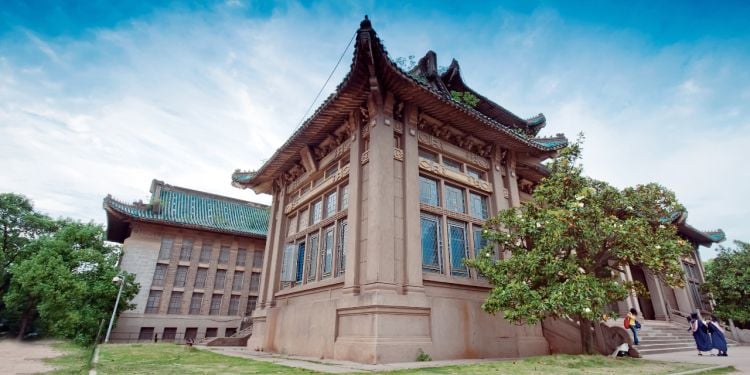
Wuhan is the capital of Hubei province, located in the heartland of China. The city's central location makes it easy to explore the rest of the country from. It's also well-connected to China's major cities, including Shanghai and Beijing. With that, the cost of living in Wuhan is relatively lower compared to other popular destinations in China. This makes it a suitable destination for those who want to continue their studies in Wuhan or come here to learn Chinese.
Why study in Wuhan?
Wuhan is one of the fastest-growing cities in China and was formed in 1927 from the unification of three towns - Wuchang, Hankou, and Hanyang. Since then, the city has grown even more to a population of over 10 million. It is the industrial and commercial center in Central China, focusing on industries such as high-tech, manufacturing, engineering, and pharmacy. On top of that, Wuhan is an important transportation hub in China, connecting major cities in all directions through high-speed railways and expressways. The city's Wuhan University and Huazhong University of Science and Technology are ranked within the world's top 500 as per the QS University Ranking of the world's top universities.
Wuhan offers interesting historical and cultural attractions to its locals and visitors alike. For example, it is home to the largest lake within a city in China, covering a total area of over 80 km². In the springtime, the shores surrounding East Lake are filled with Mei and Cherry Blossoms, as well as lotuses. The Hubei Provincial Museum counts over 200,000 artifacts, making it one of the leading museums in the country. The tomb of Marquis Yi from the fifth century BCE, in particular, is regarded as a world treasure. The Yellow Crane Tower is Wuhan's most famous landmark, which was first built in 220 AD. Standing on the top floor of the tower reveals breathtaking views of the city.
The cost of living in Wuhan is notably lower compared to cities like Shanghai and Beijing. With that, you get access to all the modern conveniences of a big city.
Important:
In 2020, Wuhan became the center of the spread of the COVID-19 pandemic. The city has recovered; however, during the pandemic, many expats left Wuhan and have been unable to return since. So, you need to be aware that the expat community in Wuhan is now substantially smaller.
The city has also been on several lockdowns, which has affected its working and academic environment. If you plan to relocate to Wuhan for studies, make sure to check what the situation is like in the city at the time of your planned move.
The academic environment in Wuhan
Due to the comparably low tuition fees and cost of living compared to Beijing in the north and Shanghai in the east, Wuhan ranks in the top 50 of the 'affordability' category in the Best Student Cities index. This makes the city in Central China a popular destination for international students.
The city is home to four scientific and technological development parks, such as the Wuhan East Lake High-Tech Development Zone and a selection of enterprise incubators and research institutes; it is the main center of education and science in China.
Moreover, the Chinese government has recently improved its regulations regarding work visas for international students and implemented new policies allowing international students to take up internships, seek part-time jobs, and even start their own businesses in China after graduating from university.
Wuhan universities offer a large number of English-taught programs, mainly at the master's level, which also attracts a lot of international students seeking to explore an authentic Chinese experience in a smaller city away from Beijing and Shanghai.
Universities in Wuhan
The two most prominent universities in Wuhan are Wuhan University and Huazhong University of Science and Technology.
Wuhan University (WHU)
Wuhan University was founded in 1893 by the governor of Hubei and Hunan Province in the late Qing Dynasty. Only several decades later, the university established six colleges, including the colleges of liberal art, law, sciences, engineering, agriculture and medicine. Blending the Chinese and Western styles, it is regarded as one of the most beautiful campuses in China.
Moreover, the university has a faculty consisting of over 3,700 people, including 741 international staff. Wuhan University has nearly 50,000 students and over 3,600 international students, 61% of whom are undergrads.
Huazhong University of Science and Technology (HUST)
Literally translating to 'Central China University of Science and Technology, HUST is one of the 16 key national universities, directly under the administration of the Ministry of Education of China, located by the beautiful East Lake of Wuhan. The university is comprised of twelve divisions: engineering, medicine, management, science, philosophy, economics, law, education, literature, history, agriculture, and art. Huazhong University of Science and Technology also leads Wuhan National Laboratories for Opto-electronics (WNLO), one of the five national laboratories in China.
The university was also selected to join China's '211 Project', a project to fund and develop 100 key universities and colleges in the country, as well as the '985 Project' aimed at boosting top-class Chinese universities at an international level. The current student body is just above 60,000, with over 2,000 international students enrolled at HUST coming from all over the world. Moreover, there are over 3,700 faculty members with 67 international staff.
How to apply for a student visa to China?
To apply for a student visa to China, you can submit your visa application together with the supporting documents at the Chinese VISA Application Service Centre or the Chinese Consulate or Embassy in your home country.
First, make sure that the education establishment you are applying to has the right to offer courses for foreign nationals. If your application is successful, the establishment will send you an admission letter as well as a JW201 or JW202 form to complete. Keep these documents as you will need to submit them together with your application at the Embassy. You will also need to present the following supporting documents:
- Original passport valid for at least six months;
- passport-size photograph;
- copy of the acceptance letter (together with the original);
- proof of legal status in the country you are applying from; and
- evidence of your flights and arranged accommodation.
For post-graduate education programs, you will also be asked to present photocopies of your diplomas and academic transcripts translated into Chinese.
Once your visa is approved, you will need to take a series of medical examinations. Depending on the educational establishment you plan to study at, you may be asked to do a medical check in your home country or upon arrival in China. It is usually recommended to do the medical examination once you arrive in China to ensure it's completed in the right format. Moreover, some universities may arrange for groups of students to go through the check together. Your medical certificate is valid for six months.
Those with an X1 Visa will need to apply for a Temporary Residence Permit within 30 days of arriving in China. The permit is typically issued for a minimum period of 6 months and a maximum of 5 years.
Important:
You are not allowed to work on a student visa. Internship options may be available (check with your school/university), as well as volunteering.
The list of required documents may vary depending on your country of residence and the study program you are applying for. Contact your Chinese Embassy for an updated list of documents needed before the appointment.
Study culture in Wuhan
Study culture in Wuhan (as in most other cities in China) is primarily hierarchical. Students are generally required to formally address the teachers using 'professor' or “laoshi” in Mandarin. Depending on the major and type of school you are studying at, you will either be part of a fixed group of students with the same schedule or attend your classes individually for each lecture. Professors hold exams and sometimes projects to calculate the grades. The number of projects and exams can vary depending on the professor.
Attendance is a crucial factor in both your academic success and the ability to keep your student visa. Be aware that Chinese universities are required to submit attendance records of international students to the Bureau of Immigration. If your attendance is below what's required for a student visa, your visa may be canceled, or you may find yourself unable to renew it.
Some Chinese universities offer tuition in English. However, if you wish to take multidisciplinary courses in Chinese, you must pass the international test of Mandarin, also known as HSK. Sessions of examination for the HSK are held both in China and in many different countries. For HSK examination dates in your area, please refer to the Chinese Consulate or Embassy in your country.
Scholarship schemes are available to international students in China. Please contact your home university, the embassy or consulate of China, or the China Scholarship Council (CSC) to find out more information about government-sponsored programs and scholarships available.
Student life in Wuhan
The capital of Hubei province, Wuhan is the most populous city in central China, home to over ten million people. It's a famous Chinese city known as a political, commercial, cultural and educational center.
While living in Wuhan, you will enjoy all the benefits of a large city with access to lots of commercial amenities. There are many restaurants and street stalls in Wuhan where you can explore Chinese cuisine in full. There are also lots of bars, karaoke rooms and other entertainment spots in the city, which are popular with local students.
With that, you will also be benefiting from a relatively low cost of living –– especially when compared to China's first-tier cities like Beijing or Shanghai. In addition, the city is well connected with other destinations in China via the Wuhan Tianhe International Airport and the high-speed railway network: you can get from Wuhan to Shanghai in just four to six hours via the high-speed rail.
Wuhan is also a great place to learn about Chinese history. Here, you will find the famous Villa of Chairman Mao Zedong, located on the bank of the not less famous East Lake. A lot of traditional architecture has also been preserved in Wuhan.
Study Chinese in Wuhan
If you are not ready to commit to a full-time study program in China, consider taking up a Chinese language course in Wuhan. This may be a good way to test the waters and see if you are interested in staying in the country longer. Learning Chinese is also a good way to gain a better standing in the local employment market — in case you may be interested in building a career in China. Some universities and many training centers in Wuhan offer specialized courses for learning Chinese. You can easily find these by running a quick online search. Studying Chinese in Wuhan can be a great way to explore the country and its culture, network with fellow students from around the world, and discover job opportunities in Wuhan and beyond.
Useful links:
We do our best to provide accurate and up to date information. However, if you have noticed any inaccuracies in this article, please let us know in the comments section below.












Comments